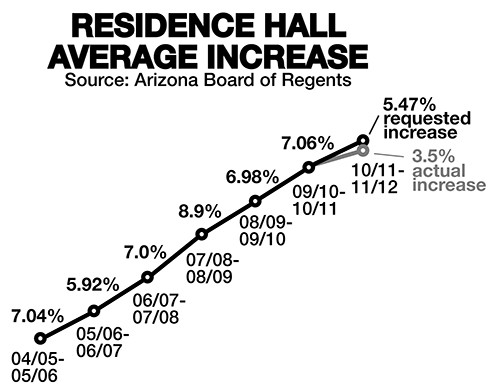Residence hall rates will increase by the smallest percentage in recent years based on a request by the Arizona Board of Regents.
Hall rates increase annually to account for Residence Life debt services and inflation, according to Residence Life Director Jim Van Arsdel. Residence hall rates have risen an average of 7.15 percent each year since the 2004 to 2005 school year, according to proposals submitted to the Arizona Board of Regents.
The original proposal submitted by Residence Life would have increased undergraduate residence hall rates an average of 7.08 percent and all campus halls an average of 5.47 percent for next year. Regents rejected the proposal and later approved raising rates 3.5 percent across the board at their meeting last week.
The two new halls set to open in the fall will cost residents $7,410 for the year. Cost for the next tier of residence halls is set at $6,717, tier-three halls will cost $5,892 and tier-four halls will cost $5,320 under the approved proposal.
Rate increases from the past several years have helped generate revenue to pay for the two new residence halls under construction. The buildings will increase Residence Life debt services $12 million a year, according to Van Arsdel.
“”Those are really expensive projects,”” Van Arsdel said. “”We have to figure out a way of generating money to pay that off.””
Under the original proposal, 2.2 percent of revenue from increases would have funded debt services. The other 3.3 percent would have been used for increased operating expenses and improvements such as installing security cameras around residence halls, according to Vice President of Student Affairs Melissa Vito.
The regents cited the increases as being too high considering the state of the economy. Residence Life representatives reconfigured the proposal overnight to propose the 3.5 percent increase.
The reduction in approved increases will result in $920,000 less funding for these improvements, Vito said. Maintenance may be deferred and contribute to rate increases in the future.
“”The needs won’t go away,”” she said.
Residence Life reviews its budget each year and projects future needs when setting rates, according to Van Arsdel. Residence Life is financially sustained on rent and does not receive funding from tuition, student fees or the state.
“”We are business-like in that sense,”” he said.
Rates are based on this need rather than a direct comparison to the off-campus market, according to Van Arsdel. He said most people who live in residence halls are freshmen committed to living on campus.
“”The typical student isn’t choosing between a residence hall or the community,”” Van Arsdel said. “”The choice the person is making is living in a residence hall at the UA or a residence hall on another campus.””
Rachel Held, a junior studying psychology and mathematics, said she lived on campus her freshman year and did not consider other options.
“”I knew I wanted to live on campus for my first year to be there for everything,”” she said.
Held said she moved off campus the following year for more personal space and not because of cost increases.
“”Looking back on it, living off campus is probably more cost effective for me,”” she said. “”But even with cost increases, if I could go back and do it over I would live on campus again my freshman year.””
On-campus housing continues to reach capacity as costs increase, Vito said. Financial aid awarded to students uses current residence hall rates in the estimate of the cost of living.
“”Demand has grown every year or has been stable,”” Vito said. “”It has not declined.””
Increases in rates will continue as inflation raises operational costs, Van Arsdel said. He said he does not foresee massive construction after the completion of the new halls, which may limit increases funding debt services.
“”What we try to do with our analysis is always start with the basic question, ‘Do we need more money?'”” Van Arsdel said. “”If we don’t, we have no justification for an increase.””









